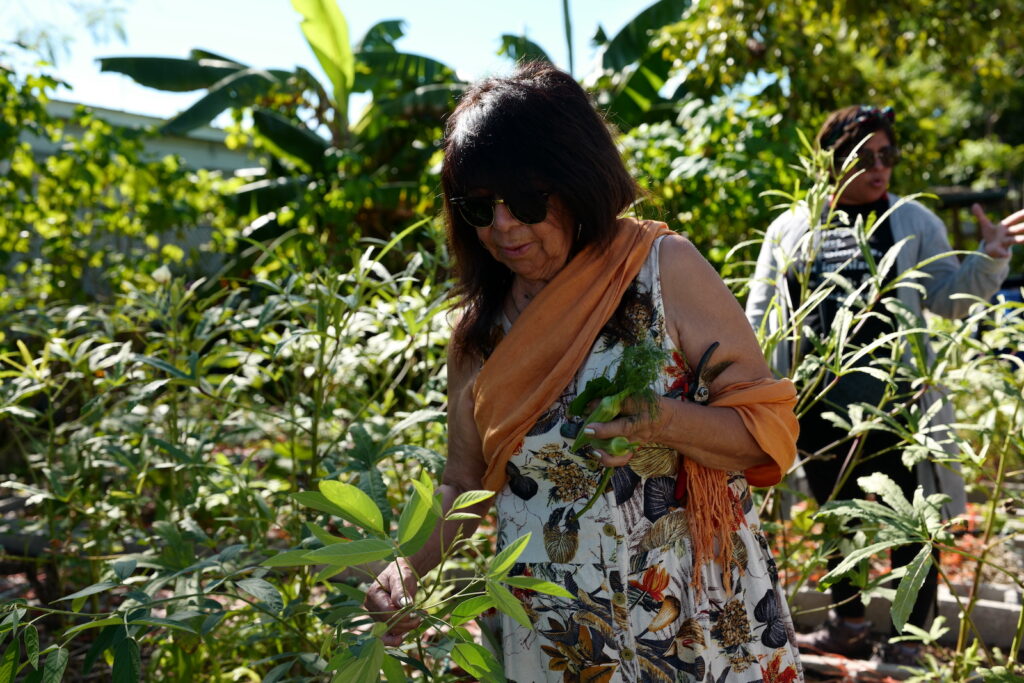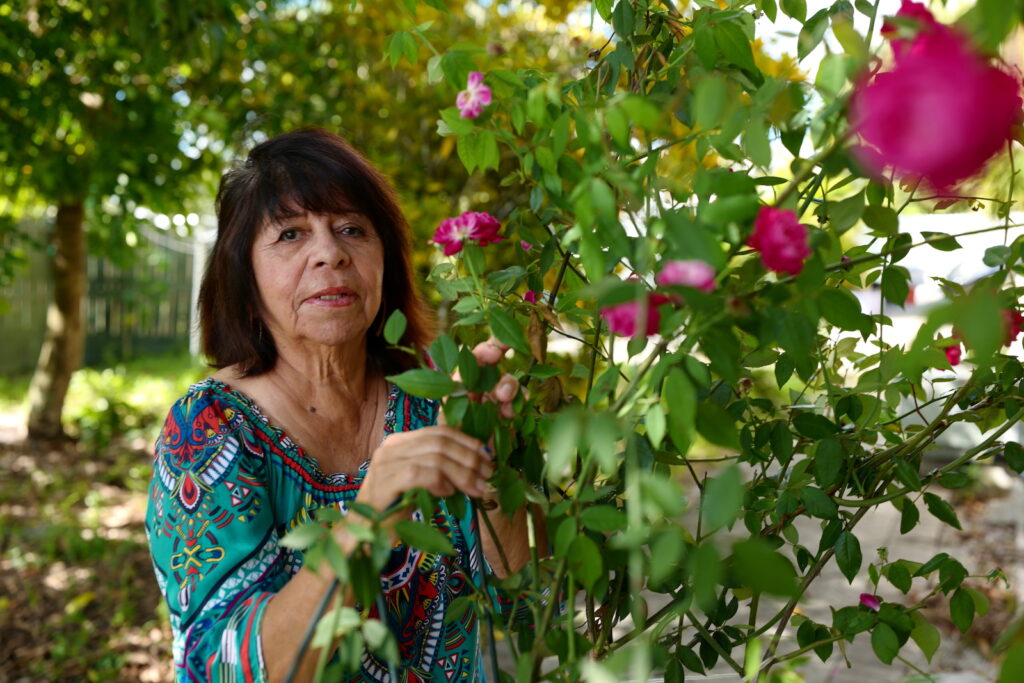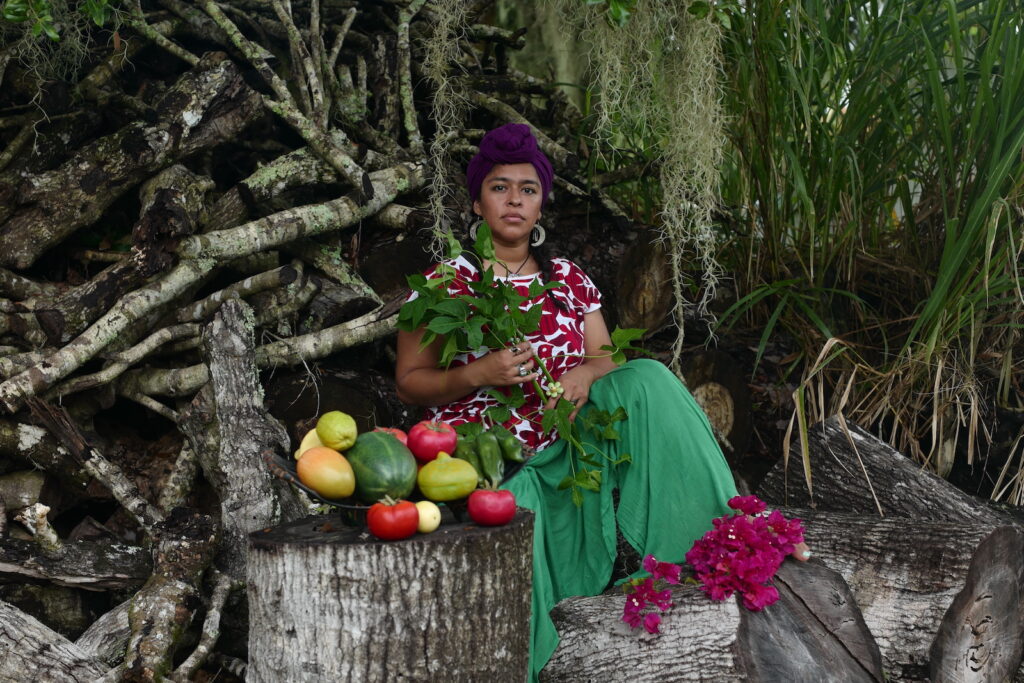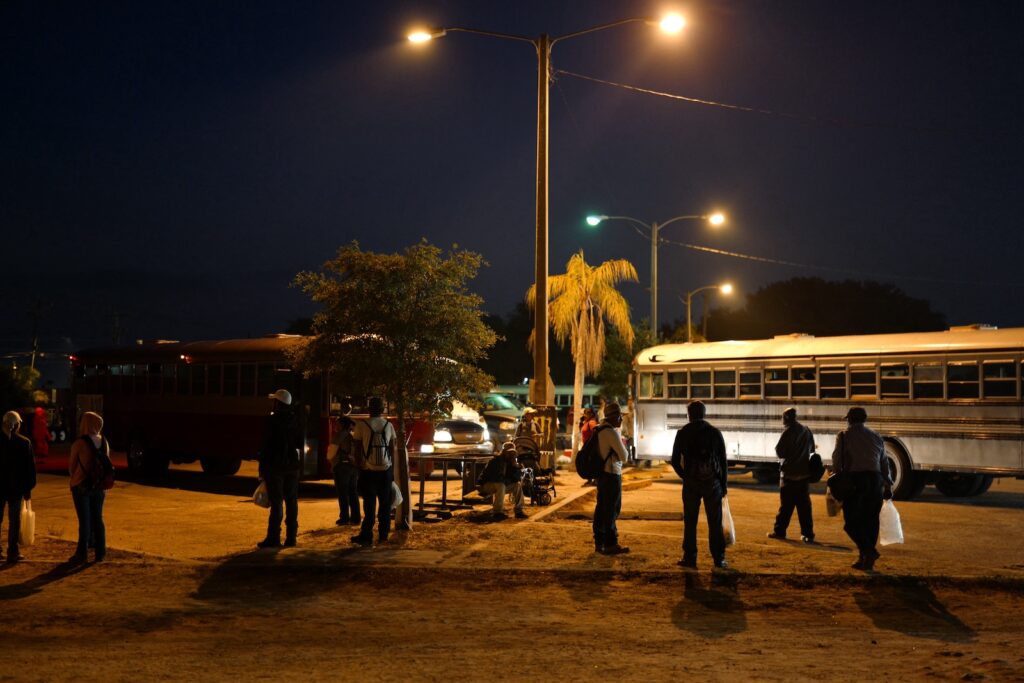Less than an hour from Southwest Florida’s highly coveted coastlines and palm tree-adorned roadways lies Immokalee, a rural town where a multibillion-dollar agricultural industry booms. Immokalee is home to approximately twenty-seven thousand residents, who compose the immigrant farmworker population of Southwest Florida, including people from Guatemala, Haiti, and Mexico. This community from the Global South is often at the epicenter of labor exploitation, police violence, and anti-immigrant policies. For this reason, social justice movements have always been present in Immokalee, advocating for the rights and dignity of its people. These movements are crucial in highlighting the community’s struggles and pushing for meaningful change.
Since the 1970s, Lupita Vazquez Reyes and her family have confronted the exploitation of farmworkers in Immokalee. Vazquez Reyes’s parents, Candelario “Cande” Vazquez and Cristina “Casa” Vazquez, worked tirelessly in the tomato fields, fully aware of the deplorable treatment endured by workers. Motivated by a strong sense of justice, Vazquez Reyes’s parents actively engaged in advocacy work for farmworkers. Always by their side, Vazquez Reyes and her siblings learned at an early age the importance of community and addressing social injustices. Their commitment to these teachings deepened after the passing of Vazquez Reyes’s father in the summer of 1996, his cancer believed to have been caused by exposure to the toxic pesticides used in the agricultural fields.

In this conversation, Vazquez Reyes, an Army veteran, community organizer, and manager of a local community garden, and Ariana Ávila, an anthropology PhD candidate at University of North Carolina at Chapel Hill—both daughters of Mexican immigrant agricultural farmworkers—discuss Immokalee’s farmworker rights movement. Cristina Vazquez, Vazquez Reyes’s mother, shares her experiences within the farmworker rights movement and how it intertwines with their family’s ongoing political engagement.
During the time of this interview, Florida governor Ron DeSantis signed into law Senate Bill 1718, legislation targeting workers with precarious immigration statuses. In response to DeSantis’s anti-immigrant law, Vazquez Reyes and community organizers from Unidos Immokalee (United for Immokalee) organized a “Know Your Rights” flyer campaign, held a candlelight vigil, and coordinated the highest attended march against Senate Bill 1718 in Florida, drawing an estimated seven thousand people from Immokalee and afar. This is an excerpt of their conversation as they prepared for the law’s enactment date of July 1, 2023, and a preview of what to expect in Florida in the run-up to the 2024 US presidential election.
Ariana Ávila: Could you share more about how your parents navigated the long, arduous process to receive US citizenship?
Cristina Vazquez: My husband, Cande, would arrive home, tired from work. As he took off his boots, the kids would greet him at the door and bombard him with questions from the US citizenship study book. They would quiz him while he was still collecting himself from work. The day we went for his interview, he came out with his head bowed, as if defeated, and then said, “Surprise! Sorpresa, lo pase! I passed!” We were all very happy. He was tired as he studied, but he did it.

Lupita Vazquez Reyes: That was around 1989. In those years, my parents were already community activists. We had that idea in our family to be engaged in activism and be present in the community as people who advocated for social justice. But there were moments after my dad passed when I was disillusioned with the social justice movement, with government processes, and identifying as American. It was the sadness of losing my dad, someone who was very strong and justice oriented. When someone like that becomes a citizen and votes, for me, it felt as if my dad was the president. There was a sense of really being engaged. I think in the current climate, especially in the South and what’s happening here in Florida, we don’t know what 2024 is going to look like.
AA: How old were you when your dad became a citizen?
LVR: I was in fifth grade, so maybe ten or eleven. I had just started my career in “politics.” I was winning elections from fourth grade to ninth grade. I was president every time, except for ninth grade, when I chose to run for vice president only. After that, I wasn’t as invested.
AA: Wow. So that means your older brother was in middle school, and your younger brother was also in elementary school. And, as US-born children learning US history, y’all were helping your dad pass the citizenship test. Y’all were quizzing him with questions you had learned in class. To add to that, y’all knew the difficulties and experiences of being children of farmworkers, living here in Immokalee, and witnessing farmworker advocacy in town. And for y’all to have this sense of urgency and excitement in helping your dad become a US citizen because of what that would mean for him and for the family, that’s powerful.
LVR: Exactly. During that time, a multiracial, interfaith coalition called Collier United for Rights and Equality had been formed, so the excitement of my dad becoming a citizen was part of the momentum of being engaged in this way. Advocacy grew to mean so much more for our family.
CV: It’s easy to deport people without US citizenship; that’s just how it is. They could take Cande’s residency. And to vote! That was the main reason Cande and I became US citizens. Our white activist friends would talk to us about being able to vote.
AA: Why was it important to vote?
CV: In those days, we would gather often here at our house to research candidates and learn about them. Afterwards, I would talk to community members about what I had learned, too.
LVR: A lot of democrats aligned themselves here. The local Catholic church also wanted to see the immigrant community engaged, and helped people become US citizens, so they could exercise their right to vote.
CV: Clergy members would tell folks about the importance of voting and how it would affect their lives here.
LVR: There were local faith leaders that composed Collier United for Rights and Equality. By the time that group was established, my mom already had her citizenship.
CV: One time, the county commissioners visited Immokalee. The faith leaders and I took them around town on a bus that transported workers to the fields. We wanted to show the commissioners the conditions in town. The bus would stop, and I would tell them about the overgrown lots, areas of blight, and bad housing camps, and how all of that needed to be addressed. We would explain to them everything that was going on in Immokalee. The clergy were the ones who took the initiative to do these tours.

AA: How did y’all get involved in advocating for farmworker rights? There are people who work in agriculture but don’t get involved or are unable to get involved in the movement. Why did y’all decide to get involved?
CV: Because there was a lot of mistreatment. Farmworkers were being physically assaulted by other community members in Immokalee. There was another incident in 1977 where around forty, forty-five of us were arrested at the Devil’s Garden, a ranch in Hendry County located thirty miles north of Immokalee. The Devil’s Garden was and still is known for its wildlife and hazardous terrain. That day, contractors took us to work, later arrested us, and accused us of trespassing, when we protested the horrible working conditions and demanded our lost wages. We were met with long rifles from the police and ranch owners pointed right at our faces. How were we trespassing if they took us to work? That was around the time we met Tio Juan. After they accused us of trespassing, we went to a local community advocacy center to tell them what happened to us in the fields. Tio Juan happened to be at the center. He was a Midwest labor organizer working on farmworker labor cases in Homestead. He was working under the organizing and boycott frameworks of Cesar Chavez, Dolores Huerta, and Baldemar Velazquez under the United Farm Workers. The Immokalee office was called OMICA [Organized Migrants in Community Action] and, together with Florida Rural Legal Aid, helped get Cande, me, and the other workers out of jail.
AA: Is Tio Juan a tio-tio [a blood relative] or just tio [a family friend who became like an uncle]?
LVR: Just tio.
CV: Still, he was like a brother to my kids’ father. When their father was in the hospital, Tio Juan was always at his bedside. He would fly in from Chicago, rent a car, and arrive directly to the hospital.
LVR: Tio Juan’s father had a billiard house on Eighteenth Street and Pilsen in Chicago, in the barrio of the Chicanos. He grew up there, and everyone, from gangsters to recent migrants, would arrive at the pool house so he could help them review documents or report abuses. The pool house was where community members gathered. Eventually, he worked as a youth mentor for young men involved with gangs. He knew how to talk with them. Everyone called him “Mama John” because he was like a mother. He would care for them. He became involved in politics as the first Chicano to run for Alderman in that area. Later, he was pivotal in a lot of campaigns to put people of color in those positions, Black and Brown. He served as the Chicago Streets and Sanitation Department deputy commissioner under Mayor Harold Washington, and Supervisor of Elections for Cook County. He was very involved. Most important, he cofounded Casa Aztlán, a cultural center, where Chicanos and Mexicans could learn how to organize under the framework of Cesar Chavez.
CV: Tio Juan took us to an organizing school in Chicago.
LVR: Yeah, my parents went to a labor organizing school. Sometime after that first arrest, they went to Chicago and spent a couple of weeks at Casa Aztlán. There, they learned about labor organizing and the importance of people power. That experience in Chicago helped form my parents’ identity and their values as a farmworker, migrant family living in Immokalee. Tio Juan’s friendship and mentoring as a Chicano labor organizer really empowered us all to believe in the power of our community. His knowledge and resources throughout the West Coast and Midwest farmworker movements proved pivotal at a time when South Florida was experiencing an influx of immigrant workers in the tomato fields. Through Tio Juan and other interfaith community leaders in those early days of our migrant farmworker life we formed deep community relationships and opportunities for strong advocacy and engagement. I recall times where gatherings often focused on talking about what was happening in Immokalee. Prioritizing civic engagement and leadership was really born from creating those early networks of mutual aid, and community advocacy and my parents believing in their ability to speak truth to power. The importance of gaining citizenship and the responsibility of voting in government elections was the most natural next step. From local government to the school board, everything that is decided is in the hands of certain people, but with our votes, we, too, have the power. That would not have been possible without the arrest my mom and dad experienced in those fields.
CV: Following that arrest in the Devil’s Garden, I had digestive issues for a week. I was terrified. Then, they separated us—men in one van and women in another. But I said, “I’m going with my Cande.” I got in the van with the men, and they didn’t say anything. We were always together in la labor so what made this any different? When that happened, I was also pregnant with my eldest son.

LVR: It all started because a rattlesnake appeared among the tall grass and the workers felt that the area was too dangerous. At the same time, there was nothing to pick, so the workers said, “Hey, if we don’t have anything to pick, then why are we here?”
CV: The best workers, the ones who harvested the fastest, had barely gathered $3.25 worth of produce. At that time, they were paying twenty-five cents per bucket of bell peppers. No, pues no. I had barely harvested two dollars’ worth of produce. Folks were saying, “We are going on strike!” One of the crew leaders sided with us. They arrested us because we didn’t want to work at the Devil’s Garden. There was nothing to harvest. We would walk and it was just weeds. Tio Juan was on his way to Homestead when we were arrested. Later, we took him to see the ranch.
LVR: Yeah, Tio Juan wasn’t really organizing in Immokalee yet. They were making a pitstop at the community advocacy center on their way to Homestead. That’s why Cesar Chavez took a nap in the apartment where you have been living throughout your fieldwork in Immokalee. They made a pitstop in town and took a break at our family home.
CV: Right away, Tio Juan and everyone mobilized. We were told that we were going to spend several days in jail, but lawyers from all over Florida arrived to help us. The lawyers worked late into the night at the jailhouse in Labelle. They didn’t care what time they finished; they wanted us to be released. We were photographed as we left the jail and ended up appearing in a local newspaper. A year later, we were each sent a three-hundred-dollar or four-hundred-dollar check. We were so happy.
AA: With more than forty farmworkers arrested, I see how this incident activated the network of attorneys and activists advocating for farmworkers’ rights. And after that is when you and your husband learned how to organize, right? And when the both of you became citizens?
CV: Yes. From that point forward, I became very involved in the movement.
LVR: It was very interesting. Although my dad was a great speaker, very well read, during those times I saw my dad working in la labor, but I saw how my mom confronted the fight with more huevos, more enthusiasm. My dad was a more reserved leader. He gave the example of love and peacefulness. But my mom was very direct and explained to people how things were. It was a good balance. My dad liked having peace. He didn’t like conflict. However, if my dad witnessed an injustice, he immediately spoke up. He was like an academic. He was very intelligent. He explained to folks why something was happening and focused only on the truth about the realities workers faced.

AA: From all of this, why is it important to vote and to encourage folks in Immokalee to vote or to become citizens if they can?
CV: I’ve helped several folks become citizens. Faith leaders reached out to me to help others in Immokalee. Twice a week, we would gather at the library, where I would help people study for the citizenship test. After my first student passed the test, the faith leaders asked me to help others, and I did. I also go door to door telling people the importance of voting. They respond, “Why vote if I don’t get anything in return?” I tell them that we also have to think about justice in this country, but people often respond with, “Well, politicians don’t do anything for us.”
LVR: If we are doing door-to-door campaigns, we have to be prepared with responses to demonstrate the benefits they do have at this moment. For me, a common theme of being back home in Immokalee is visibility. As we engage in the civic processes and as immigrants in the South, it’s even more imperative that we remain visible in those democratic processes. We have to show how the democratic process helps the people. It’s a little difficult, but from the participatory conversations we have in the garden to showing up on poll day, it matters. Most immigrants here are the backbone of the South. In the garden, I’m working with a lot of people who are not voting constituents. Yet, the garden is a space where we become conscious of decisions being made for them. For me, I lean into my voting privilege and the responsibility I have. I want to use my vote in a way that counts for the people who can’t vote. My citizenship gives me this freedom and responsibility to vote. I don’t see the right to vote and citizenship as separate from those who cannot vote. We need to elevate the importance of voting now.
Ariana Ávila is a PhD candidate in the anthropology department at the University of North Carolina at Chapel Hill. From fall 2021 to spring 2022, she was a Graduate Fellow in The Townsend Family Southern Futures Graduate Scholars program. Her dissertation focuses on how farmworkers in Immokalee, Florida, practice food sharing and gardening as a form of community care.
Lisette Morales is a photographer and writer based in Southwest Florida. Lisette was born in Nicaragua of Nahua ancestry. Her work focuses is documenting the interplay of people and their environment.
Lupita Vazquez Reyes is an Immokalee, Florida native, with roots from the Otomi (Hñahñu) people in Mexico’s Central Valley. She is a community organizer, cultural worker, and gardener. She draws on her heritage and her experience as the daughter of immigrant farmworkers to inspire change in her community. Vazquez Reyes focuses on connecting local knowledge with ancestral growing practices, storytelling, and stewardship of food ways and language.
Header image: Cempasuchil (marigolds) harvested by Cristina Carrillo Vazquez to lay on the grave of Cande Vazquez, her late husband. Photograph by Lisette Morales McCabe.

